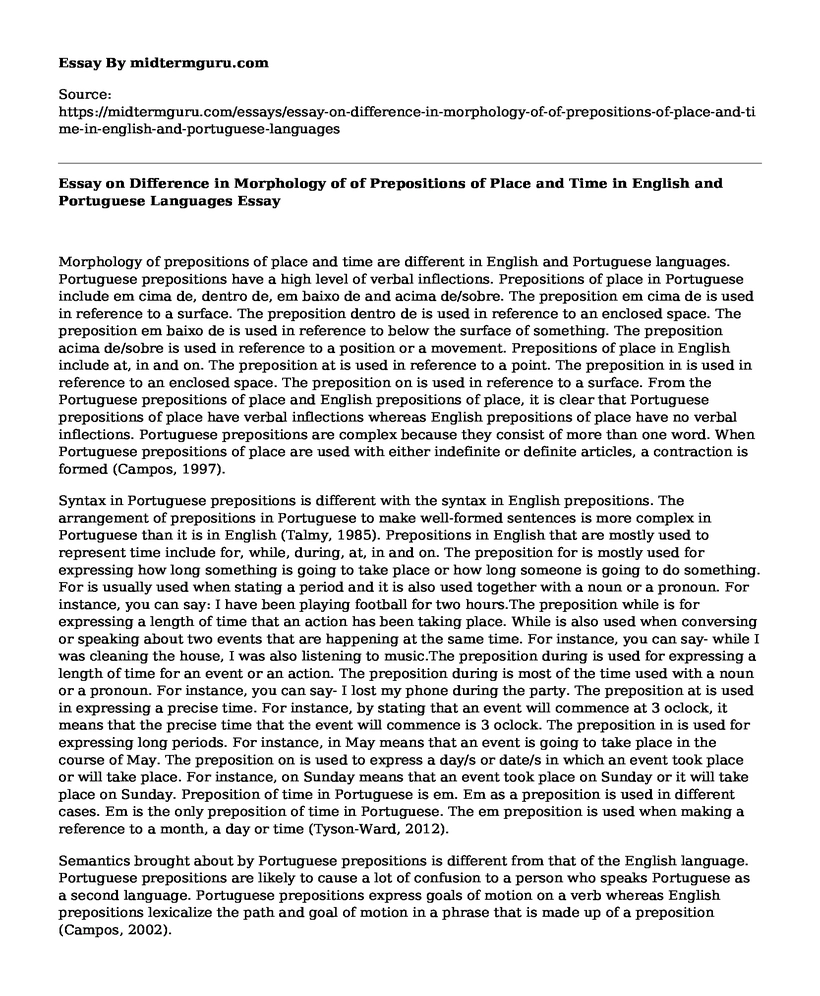Morphology of prepositions of place and time are different in English and Portuguese languages. Portuguese prepositions have a high level of verbal inflections. Prepositions of place in Portuguese include em cima de, dentro de, em baixo de and acima de/sobre. The preposition em cima de is used in reference to a surface. The preposition dentro de is used in reference to an enclosed space. The preposition em baixo de is used in reference to below the surface of something. The preposition acima de/sobre is used in reference to a position or a movement. Prepositions of place in English include at, in and on. The preposition at is used in reference to a point. The preposition in is used in reference to an enclosed space. The preposition on is used in reference to a surface. From the Portuguese prepositions of place and English prepositions of place, it is clear that Portuguese prepositions of place have verbal inflections whereas English prepositions of place have no verbal inflections. Portuguese prepositions are complex because they consist of more than one word. When Portuguese prepositions of place are used with either indefinite or definite articles, a contraction is formed (Campos, 1997).
Syntax in Portuguese prepositions is different with the syntax in English prepositions. The arrangement of prepositions in Portuguese to make well-formed sentences is more complex in Portuguese than it is in English (Talmy, 1985). Prepositions in English that are mostly used to represent time include for, while, during, at, in and on. The preposition for is mostly used for expressing how long something is going to take place or how long someone is going to do something. For is usually used when stating a period and it is also used together with a noun or a pronoun. For instance, you can say: I have been playing football for two hours.The preposition while is for expressing a length of time that an action has been taking place. While is also used when conversing or speaking about two events that are happening at the same time. For instance, you can say- while I was cleaning the house, I was also listening to music.The preposition during is used for expressing a length of time for an event or an action. The preposition during is most of the time used with a noun or a pronoun. For instance, you can say- I lost my phone during the party. The preposition at is used in expressing a precise time. For instance, by stating that an event will commence at 3 oclock, it means that the precise time that the event will commence is 3 oclock. The preposition in is used for expressing long periods. For instance, in May means that an event is going to take place in the course of May. The preposition on is used to express a day/s or date/s in which an event took place or will take place. For instance, on Sunday means that an event took place on Sunday or it will take place on Sunday. Preposition of time in Portuguese is em. Em as a preposition is used in different cases. Em is the only preposition of time in Portuguese. The em preposition is used when making a reference to a month, a day or time (Tyson-Ward, 2012).
Semantics brought about by Portuguese prepositions is different from that of the English language. Portuguese prepositions are likely to cause a lot of confusion to a person who speaks Portuguese as a second language. Portuguese prepositions express goals of motion on a verb whereas English prepositions lexicalize the path and goal of motion in a phrase that is made up of a preposition (Campos, 2002).
References
Campos, M.H.C. (1997). Tempo, Aspecto e Modalidade. Estudos de Linguistica Portuguesa. Porto: Porto Editora.
Campos, M.H.C. (2002) Questoes aspectuais: algumas especificidades do portugues in C. Doll & C. Hundt (eds.) Ex oriente lux, Frankfurt am Main: Valentia.
Talmy, L. (1985). Lexicalization Patterns Semantic Structure in Lexical Forms in T. Shopen (ed.) Language Typology and Syntactic Description III: Grammatical Categories and the Lexicon. Cambridge: Cambridge University Press, 57-150.
Tyson-Ward, S. (2012). Essential Portuguese grammar. London: Teach Yourself.
Cite this page
Essay on Difference in Morphology of of Prepositions of Place and Time in English and Portuguese Languages. (2021, Jun 11). Retrieved from https://midtermguru.com/essays/essay-on-difference-in-morphology-of-of-prepositions-of-place-and-time-in-english-and-portuguese-languages
If you are the original author of this essay and no longer wish to have it published on the midtermguru.com website, please click below to request its removal:
- Essay on How the School System in Jamaica and America Differ
- Essay on Event or Set of Events That You Find Significant
- Essay Sample on Knight in Shining Armor
- Paper Example on Helping Parents of English Language Learners
- Paper Example on Behavioral Issues for Deaf and Hard of Hearing Students
- Quality of Life in Early Childhood: A Must-Know - Essay Sample
- Deborah Tannen: How Language Affects Relationships - Essay Sample







